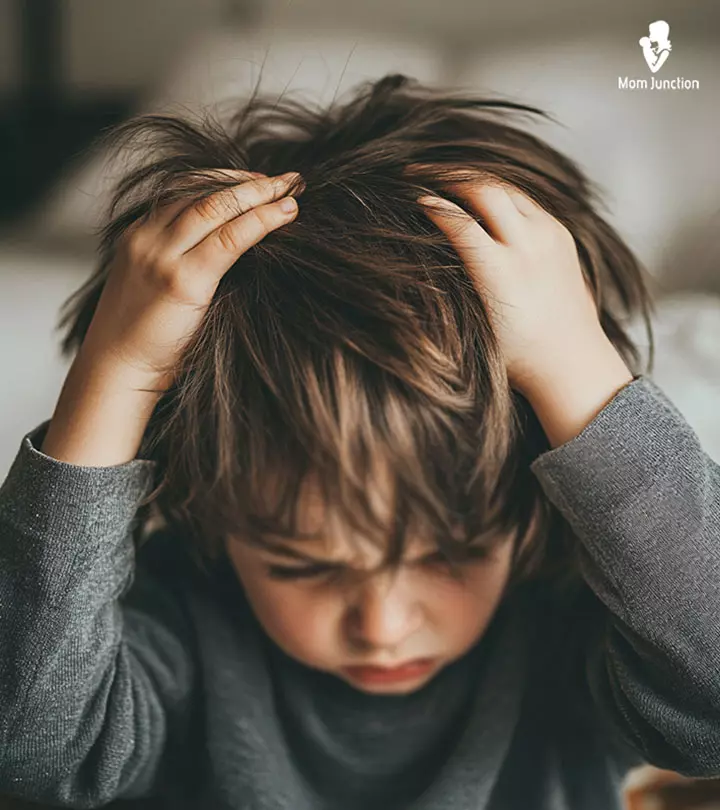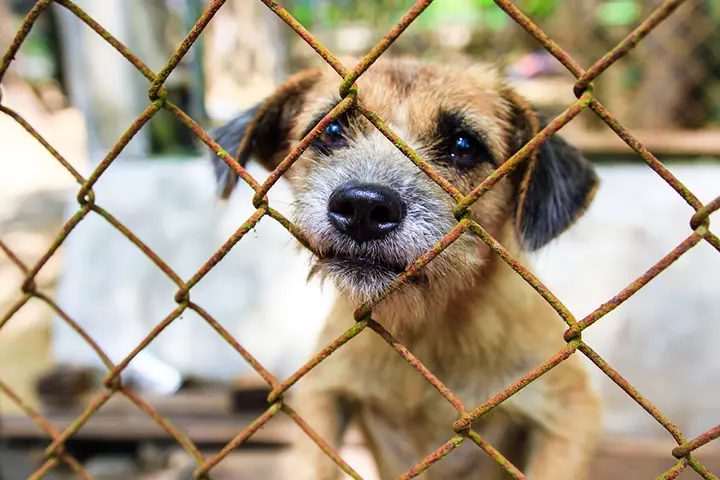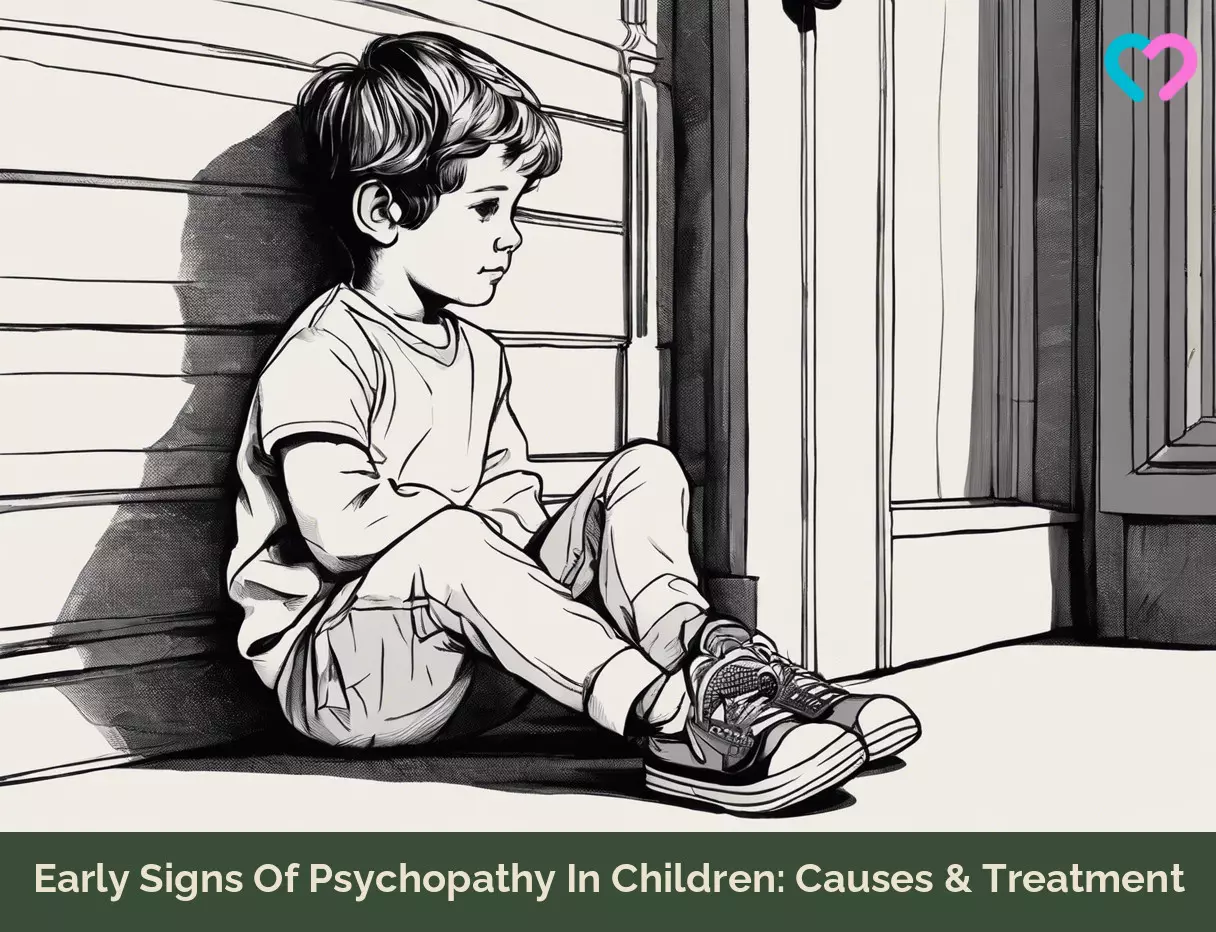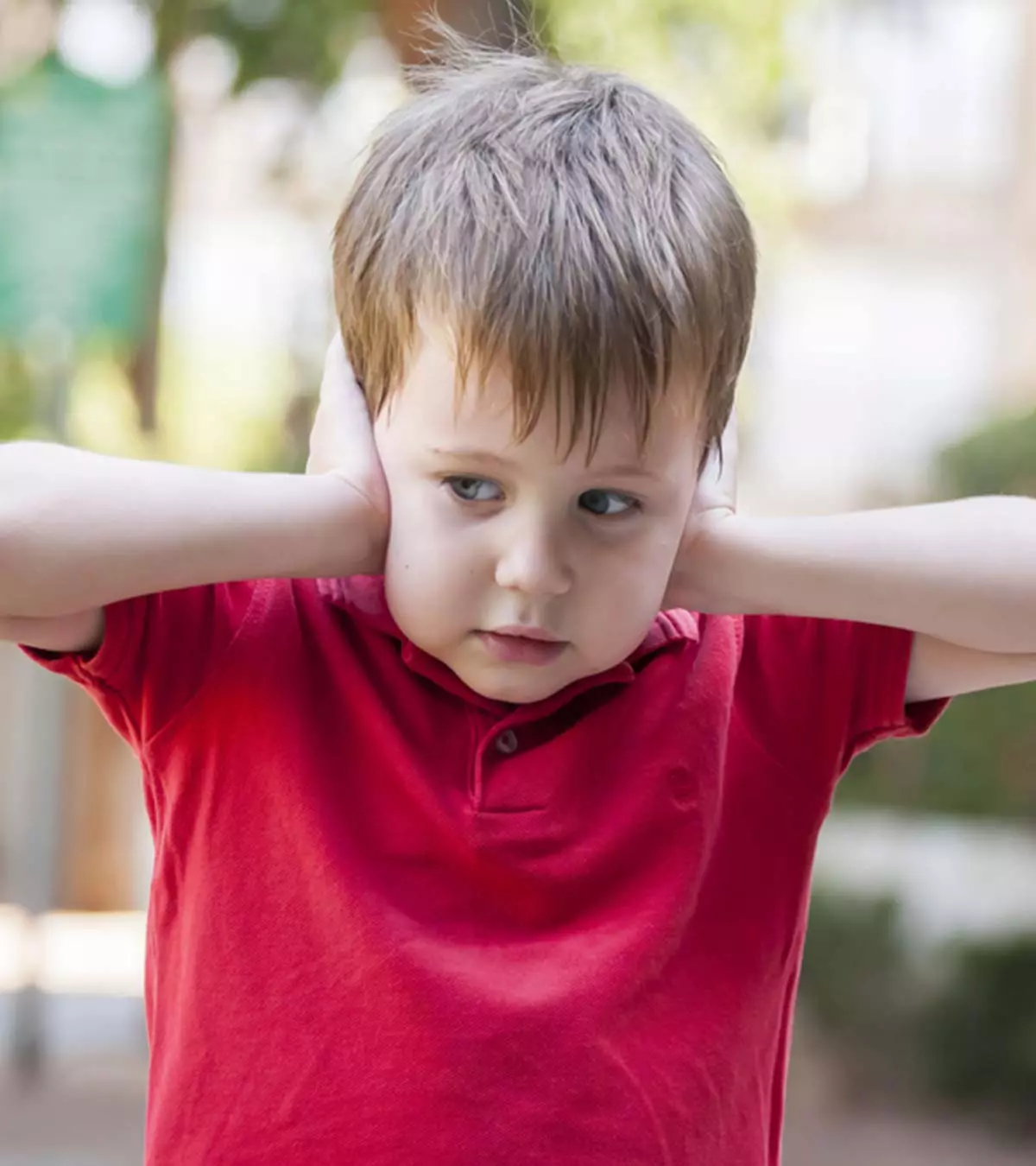
Image: Midjourney/ MomJunction Design Team
Psychopathy is a neuropsychiatriciThe field of medicine that focuses on mental disorders associated with nervous system diseases. disorder that is considered a type of antisocial personality disorder (ASPD). According to the US Centers for Disease Control and Prevention (CDC), approximately 20% of children encounter a mental disorder within a given year, and psychopathy is one such disorder. It is characterized by a deficiency of emotional responses, poor social skills, and lack of empathy, resulting in an antisocial personality and a tendency for criminal behavior (1). Psychopathic children tend to exhibit repeated behaviors of apathy and a lack of social awareness in certain situations.

Psychopathy in children is a complicated condition that needs close attention and proper care. Hence, differentiating between normal childhood behavior and signs that may point to psychopathic traits is important. Read on to learn about the causes, signs, diagnosis, and treatment options for psychopathy in children.
Key Pointers
- Indifference towards others, narcissism, and risky or thrill-seeking behaviors that arise from early experiences or parenting may cause psychopathy in children.
- Aggression, lying, and tantrums are some signs indicating psychopathy. It can be diagnosed with the help of the YPI test questionnaire.
- Personalized therapy and medication can help treat the issue, avoid harsh punishments, and boost the child’s self-esteem.
Causes Of Psychopathy In Children
It was only after the 1990s that the concept called child psychopathy gained prominence. Earlier, psychopathy was associated primarily with adult psychopathy.
Researchers in the 1990s categorized psychopathy into three dimensions, namely callous-unemotional (CU) traits, Grandiose-manipulative (GM) traits, and daring-impulsive (DI) traits. They found that these were not unique to adults but could be spotted early in childhood too (2) (3).
- CU traits are a type of persistent behavior in which a person shows disregard for others and has low empathy and remorse.
- GM traits, also called narcissism, include exaggerated self-importance, feeling of superiority, preoccupation with fantasies about success and power, and urge to charm people and manipulate them.
- DI traits include thrill-seeking and risky behavior.
Studies suggest that a combination of both genetic and environmental factors can lead to psychopathic personality in children (3) (4).
 Research says
Research saysThe following are some common environmental factors.
- Parenting

Studies have shown a strong link between the type of parenting and the development of childhood-onset psychopathy. Both ends of the spectrum — harsh, cold parenting and supportive parenting — can cause a child to develop GM Traits (2). However, a stronger link is seen between negative parenting and the development of a child’s antisocial behavior (5).
- Early life experiences
A few studies have established a connection between adverse early life experiences and psychopathic traits in children. For example, a child who has experienced physical or sexual abuse or is a victim of emotional neglect can become callous and unemotional (6).
Certain studies also highlighted how genetic and environmental factors influence the co-occurrence of multiple types of child victimization.
One study concluded that children who undergo one form of victimization are more susceptible to experiencing additional forms, possibly due to shared genetic and environmental factors. Additionally, males tend to experience less emotional and sexual abuse but more physical abuse than females. Furthermore, family-specific victimizations are also more frequent than family-unspecific victimizations.

Average child-victimization scores in two subsamples by gender
Source: Genetic Vulnerability to Experiencing Child Maltreatment; Frontiers in Genetics Did you know?
Did you know?Signs Of Psychopathy In Children
Dr. Abigail Marsh, a psychologist featured by the American Psychological Association (APA), describes psychopathy as a personality disorder characterized by traits such as callousness, dominance, fearlessness, and impulsiveness (22).
Here are some typical signs that children with psychopathic traits may exhibit:
1. Lack of empathy
Children with psychopathic traits tend to lack empathy and often show hyposensitivity to other’s distress and pain (3) (7).
2. Aggression
Some children display uncontrollable hypersensitivityiExcessive or improper immunological responses to an antigen or allergy to anger meted out to them (7). which may show up as aggression in kids.
3. Extreme tantrums

Some children tend to be unruly and highly aggressive, often throwing extremely violent tantrums (8).
4. Chronic lying
Dishonesty and chronic lying are signs of psychopathy in children (9).
5. Indifference to punishment
Children with psychopathic tendencies may show an unpredictable indifference to punishments (10).
6. Superficially charming
Children with psychopathic traits can be superficially charming, with excellent manipulative abilities (3).
7. Animal cruelty

Unhinged cruelty to animals is often an early manifestation of conduct disorder and antisocial behavior in a child characterized by a lack of empathy and indifference.
8. Criminal behavior
Children with psychopathic traits tend to show delinquent-like or antisocial behaviors (10).
Joshua Webb, a psychologist and counselor, says, “People with psychopathy tend to have difficulty regulating their emotions and controlling their behavior. They often cannot recognize their actions’ consequences, leading to reckless or impulsive decision-making. Additionally, they may lack empathy and find it challenging to form meaningful connections with people.”
 Quick fact
Quick factDiagnosis Of Psychopathy In Children
The diagnostic tools for psychopathy in children are limited and self-report assessments such as Youth Psychopathic Traits Inventory (YPI) are more commonly used (9).
The YPI test is essentially a questionnaire that helps assess symptoms in children and adolescents suspected to have psychopathic traits (9). This questionnaire assesses symptoms under ten subscales, which are combined into the three psychopathic personality components, namely interpersonal, affective, and behavior (9).
The symptoms assessed under the ten subscales include (11)
- Dishonest charm
- Grandiosity
- Lying
- Manipulation
- Remorselessness
- Unemotionality
- CallousnessiThe trait of being insensitive, uncaring, or unsympathetic
- Thrill-seeking
- Impulsivity
- Irresponsibility
When To Call The Doctor?
If you notice your child lying or hiding something, it does not necessarily mean they have psychopathic traits. The behavior of a child may seem erratic at times, but it could also be a natural aspect of their development. However, if you notice your child repeatedly showing a lack of empathy and remorse, callous behavior that is not expected of them, bullying other people, or being cruel to animals, it is advisable to speak to their pediatrician. If you receive any complaint from the school or parent of other children, do take a note.
Treatment For Psychopathy In Children
Studies have shown that psychopathy increases with age, and so, prompt treatment in childhood is encouraged. The treatment for psychopathy in children is multimodal and complex. Earlier, psychopathy was thought to be untreatable; however, there have been recent advances in the field.
Children with psychopathic traits tend to be deviant in their behavior and actions and do not respond to punishments (due to their callous-unemotional traits) well. Time out as a form of punishment might help.
One of the most effective methods is using rewards when they show good behavior (12).
Since morality and empathy are not observed in children with psychopathy, rewarding them helps build their cognitive empathy (knowing what the other person feels or thinks).
Relocating troubled children, whose psychopathic traits stem from an unsafe or unhappy family environment, to a safer and more loving one can help address their tendencies towards psychopathy.
Other treatment options for psychopathy in children include (13)
- Personalized and focussed therapies: Cognitive Behavioral Therapy (CBT), Risk-Need- Responsivity (RNR), Schema-Focussed Therapy (SFT), Transference-Focused Psychotherapy (TFP) are some examples.

Some commonly used medications in these conditions include psychostimulantsiPsychotropic chemicals with the ability to stimulate the central nervous system such as methylphenidate and dextroamphetamine, antipsychoticsiA type of medication used to treat the symptoms of psychosis such as risperidone, and mood stabilizers such as lithium and divalproate (14).
 Quick fact
Quick factHow To Deal With Kids Showing Psychopathic Tendencies?
Dealing with a child who shows psychopathic tendencies might be challenging and requires a good balance of tact, love, and therapy. While they need professional intervention, parents have a critical role in managing the condition.
Here is what you can do.
- Work on your relationship with the child.
- Boost the child’s self-esteem.
- If the atmosphere at home is unstable, work on working on relationships within the family to make the environment positive and safe for the child.

Sharing tips on managing psychopathy in children through the Society for the Prevention of Disorders of Aggression, Lillyth Quillan, a parent of a child with conduct disorder/psychopathy, says, “It’s going to be a wild ride. It’s not going to be easy—it will probably be the hardest thing you’ve ever done. Keep notes of every conversation you have. Record dates and exact times. I would literally go home and spend hours writing out my notes from the conversations I had with teachers, principals, and anyone else at the school. I would actually spend longer writing out the notes than I spent having the conversations.
“Find somebody in your support system to talk to, even if they aren’t a parent. Read everything you can get your hands on. Get as much sleep as possible and take care of yourself. Good nutrition is really important. Feed your brain everything you need and cut yourself as much slack as possible. Above all, remember to breathe (i).
Frequently Asked Questions
1. Can a child be born with psychopathy?
Children are not born with psychopathy. However, some may have a higher risk of developing it due to their genetic inheritance (15).
2. What are some psychologically damaging phrases I should not say to a child?
Hurtful words from parents can have a lifelong impact on children. Hence, you should choose your words carefully. Some psychologically damaging phrases you should not say to your child are listed are, “You are a bad child” (negative labeling), “I wish you were never born” (withdrawing love), “I don’t want to talk to you” (frowning), “Your elder sibling is smarter than you” (comparing), and “You are acting like a spoiled child” (shaming) (16) (17):
3. Do children with psychopathy have friends?
Webb opines, “They can have friends, but maintaining meaningful and lasting relationships is often difficult. This is because children with psychopathy lack empathy, making it hard for them to connect with others on an emotional level. Additionally, their willingness to manipulate and take advantage of people can lead to mistrust among potential friends.”
4. At what age does a psychopath develop?
“The psychopathic traits of primary and secondary psychopathy usually manifest during adolescence. Juvenile psychopathy, however, is typically seen in children under 12 who display impulsive and oppositional behavior. It is essential to understand that these traits are not necessarily indicative of a mental disorder, as many people with psychopathic tendencies do not go on to develop a diagnosable mental illness,” Webb observes.
5. What should I do if I suspect my child has psychopathic traits?
Find a mental health expert who specializes in children and teens. They can assess your child’s behavior and give a precise diagnosis. Meanwhile, maintain a stable and supportive home environment for your child. Educating yourself by reading books on the subject or joining support groups that help connect with others going through similar experiences can also be helpful.
6. How is psychopathy different from other behavioral disorders?
Psychopathy is often confused with mental health conditions like antisocial personality disorder (ASPD) or sociopathy. While these disorders may share similar signs, ASPD involves a range of antisocial behaviors, with or without the specific traits of psychopathy or sociopathy. Psychopathy, on the other hand, is considered an innate neurodevelopmental disorder characterized by a callous and unemotional state (23) (24).
Psychopathy in children is a neuropsychiatric disorder that causes behavioral problems and emotional dysregulation. Genetics, poor parenting, and negative early life experiences are factors that can cause psychopathic traits in children. Early identification of the signs and prompt treatment initiation are essential to manage the disorder and help the child live their life. Boosting the child’s confidence, encouraging the child to work on their strengths, and reinforcing positive emotions are simple ways to deal with a child having psychopathic behavior.
Infographic: New Treatment For Children With Psychopathy
As parents, dealing with a child with dangerous and psychopathic behavior may be difficult, and you may feel hopeless sometimes. This infographic can be your light at the end of the tunnel. We provide you details of a new successful treatment and a true, inspirational story of a person who once was also dealing with a similar condition.
Some thing wrong with infographic shortcode. please verify shortcode syntax
Illustration: Early Signs Of Psychopathy In Children: Causes & Treatment

Image: Stable Diffusion/MomJunction Design Team
Personal Experience: Source
MomJunction articles include first-hand experiences to provide you with better insights through real-life narratives. Here are the sources of personal accounts referenced in this article.
i. What advice do you have for parents who think their child is at risk for Psychopathy? Ask a Parent;https://www.youtube.com/watch?v=ZMWpyXw2TEw
References
1. Nathaniel E. Anderson and Kent A. Kiehl;Psychopathy: Developmental Perspectives and their Implications for Treatment Restorative Neurology and Neuroscience (2014).
2. Reconstructing Child Psychopathy; The Association for Child and Adolescent Mental Health
3. Simone Pisano et al.;Conduct disorders and psychopathy in children and adolescents: aetiology, clinical presentation and treatment strategies of callous-unemotional traits;Italian Journal of Pediatrics (2017).
4. S. Bezdjian et al.;Psychopathic personality in children: genetic and environmental contributions;HHS Author Manuscripts (2011).
5. Catherine Tuvblad et al.;Psychopathic Personality and Negative Parent-to-Child Affect: A Longitudinal Cross-lag Twin Study;Journal of Criminal Justice (2013).
6. Leah E. Daigle and Brent Teasdale;Psychopathic Traits and Recurring Victimization: An Examination Using a Community and Clinic Sample;Criminal Justice and Behavior (2018).
7.Alice Jones Bartoll and Essi Viding; Psychopathic Traits in Young Children;Netherlands Journal of Psychology (2007).
8. Rebecca Waller and Luke Hyde;Callous-Unemotional Behaviors in Early Childhood: Measurement, Meaning, and the Influence of Parenting;Child Development Perspectives (2017).
9. Wendeng Yang et al.;Factor Structure and Construct Validity of the Youth Psychopathic Traits Inventory and Its Shorten Version in Chinese Detained Boys;Frontiers in Psychology (2019).
10. Mairead Dolan;Psychopathic Personality in Young People,Cambridge University Press (2018).
11. Youth Psychopathic Traits Inventory (YPI);Pathways to Resistance
12. Scientists Develop New Strategies for Child Psychopaths;NPR
13. Treating Psychopathy;PsychopathyIs
14. Medication; PsychotherapyIs
15. What Causes Psychopathy; PsychotherapyIs
16. Words And Actions Can Hurt; Bringing Up Great Kids
17. “Good” Children – at What Price? The Natural Child Project
18. Why do some people become psychopaths?; The Royal Society
19. Learn the Signs; PsychotherapyIs
20. Family-Focused Therapies; PsychotherapyIs
21. Tuvblad C et al., Psychopathic personality traits in 5 year old twins: the importance of genetic and shared environmental influences; European Child & Adolescent Psychiatry (2016)
22. Speaking of Psychology: Why psychopathy is more common than you think, with Abigail Marsh, PhD; American Psychological Association
23. Related Psychological Disorders and Diagnoses; PsychopathyIs
23. Sagari Sarkar et al., Differences between psychopathy and other personality disorders: evidence from neuroimaging; Cambridge University Press (2018)
Community Experiences
Join the conversation and become a part of our nurturing community! Share your stories, experiences, and insights to connect with fellow parents.
Read full bio of Shreshtha Dhar
- Joshua Webb is a psychologist and has over eight years of clinical experience. He did his PsyD from Northeastern University College of Science. He specializes in psychology and counseling and is also a homeless shelter volunteer.
 Joshua Webb is a psychologist and has over eight years of clinical experience. He did his PsyD from Northeastern University College of Science. He specializes in psychology and counseling and is also a homeless shelter volunteer.
Joshua Webb is a psychologist and has over eight years of clinical experience. He did his PsyD from Northeastern University College of Science. He specializes in psychology and counseling and is also a homeless shelter volunteer.
Read full bio of Apoorva K
Read full bio of Dr. Ritika Shah
Read full bio of Vidya Tadapatri

















